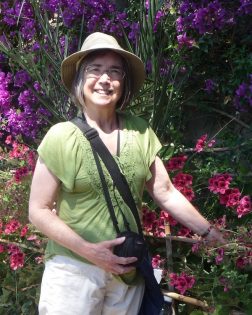Lisa Blackburn
Last Updated on March 21, 2024 by Tom Pratum

Lisa Blackburn was born and raised in southern California. As a child, she enjoyed numerous camping vacations with her family all over the western United States. These trips and her mother’s interest in gardening sparked her interest in botany and geology. When Lisa attended the University of California, Davis (UC Davis), her broad interests led her to enroll in a variety of environmental science classes. She graduated in 1974 with a Bachelor of Science degree in Renewable Natural Resources.
Lisa found herself more interested in soils and botany, recognizing that soils are key to the vegetation they support. She took more classes in soils, botany, and range management, completing an MS in Range Management from UC Davis in 1975. This qualified her for federal government positions in range conservation and soil science. Lisa started her career as a Range Conservationist in the Plumas National Forest in Milford, California. In 1976, she moved to Burns, Oregon, to work with the Bureau of Land Management (BLM). As a Range Conservationist in California and Oregon, she monitored vegetation conditions and trends by measuring and photographing trend plots, developed grazing rotation plans, and participated in plant association surveys and mapping projects. She did wild horse counts from helicopters and airplanes. Her work took her to the BLM office in Portland in 1978, where she became an Environmental Protection Specialist, serving on a team that wrote the Environmental Impact Statements (EIS) for grazing management plans in eastern Oregon. She was responsible for the vegetation, soils, water, climate, and wild horse sections. For the next 25 years, Lisa continued to work in the BLM state office in Portland as a computer specialist and Freedom of Information Act (FOIA) and Privacy Act records specialist, providing program leadership, policy guidance, technical assistance, program monitoring, and training. After her retirement in 2007, she continued to work on contract in BLM offices in Oregon, California, and Arizona.
In 2009 Lisa joined the Native Plant Society of Oregon (Cheahmill Chapter, McMinnville). She immediately assumed a leadership role in the chapter serving, first, as the Secretary (2009-2011), then as Chapter President for the next two years (2012-2014). She served for another two years as Vice President for Programs, identifying speakers who could engage both Chapter members and the public in learning more about native plants. In 2016 Lisa started another two-year term as President and is currently secretary for the Chapter. For much of this time, Lisa was involved in hospitality duties for Chapter monthly meetings. She served on the planning committee and assumed responsibility for registration for State Annual Meetings sponsored by the Cheahmill Chapter (Cannon Beach in 2014 and Grand Ronde in 2020). She helped organize the field trips and led several outings for the 2020 meeting. Lisa has given presentations to the Newberg and McMinnville garden clubs, with a focus on gardening with native plants and has staffed NPSO tables at various businesses for workplace funding campaigns. For these events, she developed handout and display materials for NPSO’s table, conveying information about the NPSO mission, work, and accomplishments, and answering questions from the public. Lisa has helped coordinate and manage the annual Cheahmill Chapter wildflower show since 2010 and has helped maintain the native plant garden around the McMinnville Library, pruning and weeding with the monthly garden work parties.
At the state level, Lisa served as the NPSO EarthShare Oregon liaison for two years. She started as a director-at-large on the State Board from 2010-2011, then served as secretary for three years, vice president for a year, and has been president since 2016. When no one responded to the call for nominations for president in 2019, Lisa agreed to continue in that role for another year. During her tenure as president, she supported a number of transitions relating to electronic communications, including development of a NPSO Facebook page, updating the NPSO website, replacing the print Bulletin with an email version, amending the bylaws to facilitate electronic voting, and offering membership renewal by PayPal. The significant conservation issue of her term was the Oregon Department of Agriculture’s Native Plant Conservation Program for listing the status of plant species that are considered threatened or endangered, for which she advocated for financial support of the program during the 2019 Legislative session.
Lisa lives in Newberg and spends time with her son, her daughter, and five grandchildren. She has traveled extensively since her retirement from BLM, but continues volunteering with NPSO, the Newberg Food Bank, and activities to support the disadvantaged in her hometown. Her backyard hosts a vegetable garden that is gradually becoming integrated with a native plant garden.
Although Lisa joined the Society relatively recently, her dedication and leadership in support of the Native Plant Society of Oregon has been unflagging. She has committed much of her retirement to efforts in sharing the NPSO mission and values to the broader public.
—Michal Wert, Cheahmill Chapter.
